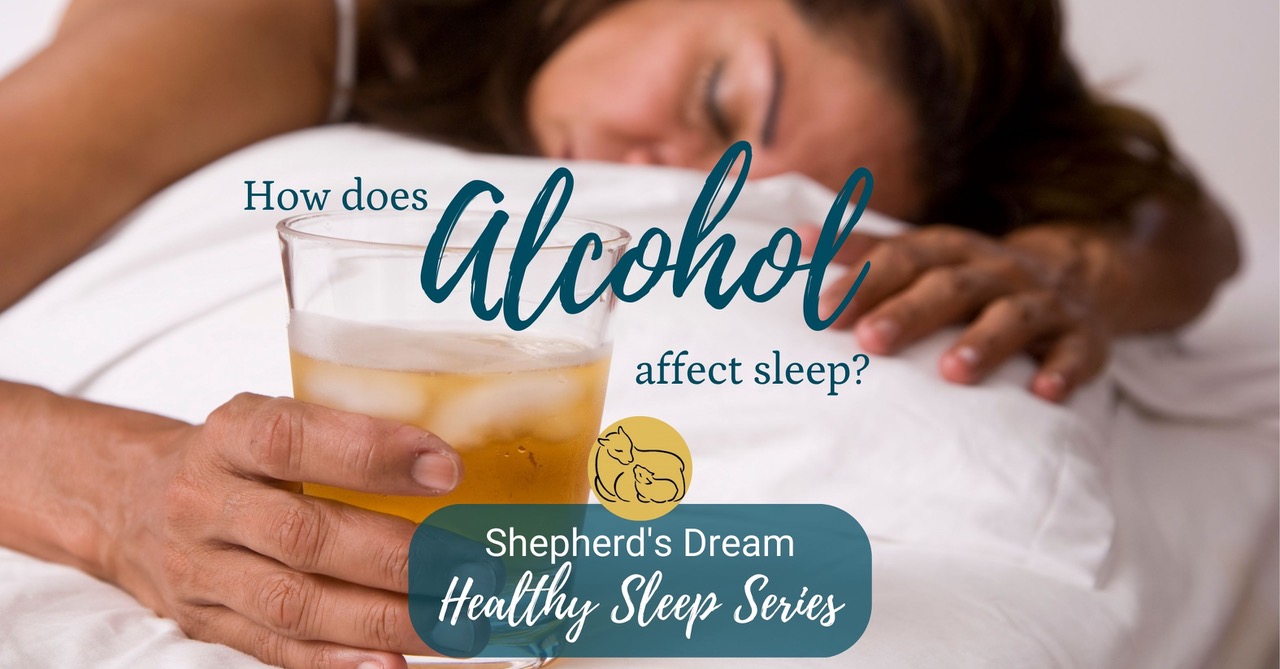Healthy Sleep Series: Alcohol
After a fun night of socializing and having a few drinks with friends, you’re feeling nice and relaxed as you crawl into bed…so why are you wide awake and questioning your life choices at 3am?!
Especially during this holiday season, and with the new year right around the corner, it’s important to keep some healthy tips in mind with regard to celebrating with alcohol. In this installment of our Healthy Sleep Series, we discuss how alcohol can impact our sleep.

Alcohol’s Effects
Alcohol is a familiar and frequent feature of our culture, so it’s easy to forget that it often comes with drawbacks.
From the moment that wine, beer, or cocktail passes your lips, your body goes to work trying to remove it. Alcohol’s effects are almost immediate, irritating the lining of your stomach, then making its way through your entire system. The kidneys go into overdrive, the liver is burdened, and the pancreas gets backed up. In addition, it can wreak havoc with your heart function, immune system, and hormones, especially with frequent drinking over time.
Alcohol is a central nervous system depressant, which leads to that drowsy, sedated feeling. This leads some people to think alcohol helps them sleep, particularly those who have trouble getting to sleep. But what’s really going on?
Understanding Sleep Architecture
Sleep is a cyclical phenomenon. We have three cycles of non-rapid eye movement (NREM) sleep and then one cycle of rapid eye movement (REM) sleep, and then that cycle repeats every 90-120 minutes, resulting in four to five of these larger cycles. Dreaming takes place during REM sleep, as well as, researchers believe, memory retention.
While sleeping after drinking, our body is working hard to metabolize the alcohol we’ve consumed. Alcohol suppresses REM during early sleep cycles, leading to an imbalance between the NREM and REM sleep. When our body has cleared most of the alcohol, sometime during the night, we’ll suddenly wake up, disrupting the rhythm of these sleep cycles.
Without that important REM sleep, even if you don’t wake up during the night, you won’t feel rested and your mental capacity is likely to suffer for at least a day.
Other Potential Culprits
Because alcohol doesn’t discriminate and affects our entire body, there are other ways it can prevent us from getting a good night’s sleep.
With our kidneys working hard, the hormone that signals our bladder to chill out isn’t present. This means more clumsy stumbles to the bathroom in the dark.
Due to the interference with regular sleep cycles and REM sleep, you may have vivid dreams or nightmares that are more likely to wake you up.
And those who experience sleep apnea may notice that their symptoms are more prevalent after a few nightcaps. Sleep apnea occurs when breathing is disrupted, either by physical means or by an issue with the brain sending proper breathing signals. Alcohol can interfere with both mechanisms, by relaxing tissues in the mouth and throat and by affecting optimal brain function.
So what can we do?
Strategies for Responsible Alcohol Intake
Experts agree that “moderate” alcohol intake is best, but what does that mean?
Most experts define moderate alcohol intake as a drink a day or less for women, and two drinks a day or less for men. However, during the holidays, there are numerous opportunities for overdoing it, so having some tools to consciously manage our fun is key.
- Make sure to eat while drinking. This slows you down and buffers the alcohol’s absorption.
- Drink water. Many of the hangover symptoms are due to dehydration. Try alternating every alcoholic beverage with a glass of water.
- Saaaaavor… Sip. Sniff. Luxuriate in your drinks, and make them special. Don’t down them as though they are quenching your thirst.
- Set limits. And keep them. Make a rule to stop imbibing an hour before your departure time. Or limit yourself to a total number of drinks—two is plenty for almost any event. Try requesting half the usual amount of alcohol be added to cocktails—you may not miss the full strength.
- Just don’t drink. Bonus points for this one! Be the trusty designated driver. Be healthy. Be the bright one at brunch the next day. There’s no buzz that feels as good as not being hungover the next day. Many folks are consciously reducing or eliminating their alcohol intake these days, so you might be surprised who else you find at the party staying clear eyed and level headed.
And give our Magic Melatonin Mocktail a try! No one will ever know you’re not drinking the latest fancy cocktail—until they see you looking fabulous the next morning.

